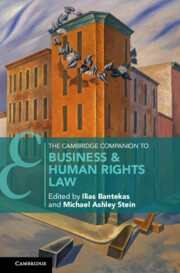Book contents
- The Cambridge Companion to Business & Human Rights Law
- Cambridge Companions to Law
- The Cambridge Companion to Business & Human Rights Law
- Copyright page
- Contents
- Figures and Tables
- Contributors
- Preface
- Cases
- Abbreviations
- 1 Business and Human Rights
- 2 Reconciling International Human Rights with International Trade
- 3 Neoliberalism, State-Capitalism and European Ordo-Liberalism
- 4 Corporate Governance and Corporate Social Responsibility
- 5 The Role of Business in International Development and the Attainment of the Sustainable Development Goals
- 6 The Business Case for Human Rights
- 7 The UN Guiding Principles on Business and Human Rights and Its Predecessors
- 8 The Regulatory Framework of Multinational Enterprises
- 9 The UN Global Compact and the OECD Guidelines for Multinational Enterprises and Their Enforcement Mechanisms
- 10 Taxation and Business
- 11 Corporate Accountability for the Natural Environment and Climate Change
- 12 Corporate Accountability for Corruption and the Business Case for Transparency
- 13 Disability, Business and Human Rights
- 14 Gender, Business and Human Rights
- 15 The Business Sector and the Rights to Work and Just and Favourable Conditions of Work
- 16 Responsible Lending
- 17 Business and Human Rights Approaches to Intellectual Property
- 18 The Role of Human Rights in Investment Law and Arbitration
- 19 The Use of International Arbitration Tribunals for Business and Human Rights Disputes
- 20 Innovative Contractual Remedies with Indigenous Peoples
- 21 The Role of Ethics in Corporate Human Rights Impact Assessments
- 22 Addressing Human Rights Impacts in Sustainability Reporting
- 23 Leveraging the Consumer-Led Movement to Strengthen Sustainable Business
- 24 The Structural Complexity of Multinational Corporations and the Effect on Managing Human Rights Risks in the Supply Chain
- 25 Towards a UN Business and Human Rights Treaty
- Index
20 - Innovative Contractual Remedies with Indigenous Peoples
Published online by Cambridge University Press: 10 September 2021
- The Cambridge Companion to Business & Human Rights Law
- Cambridge Companions to Law
- The Cambridge Companion to Business & Human Rights Law
- Copyright page
- Contents
- Figures and Tables
- Contributors
- Preface
- Cases
- Abbreviations
- 1 Business and Human Rights
- 2 Reconciling International Human Rights with International Trade
- 3 Neoliberalism, State-Capitalism and European Ordo-Liberalism
- 4 Corporate Governance and Corporate Social Responsibility
- 5 The Role of Business in International Development and the Attainment of the Sustainable Development Goals
- 6 The Business Case for Human Rights
- 7 The UN Guiding Principles on Business and Human Rights and Its Predecessors
- 8 The Regulatory Framework of Multinational Enterprises
- 9 The UN Global Compact and the OECD Guidelines for Multinational Enterprises and Their Enforcement Mechanisms
- 10 Taxation and Business
- 11 Corporate Accountability for the Natural Environment and Climate Change
- 12 Corporate Accountability for Corruption and the Business Case for Transparency
- 13 Disability, Business and Human Rights
- 14 Gender, Business and Human Rights
- 15 The Business Sector and the Rights to Work and Just and Favourable Conditions of Work
- 16 Responsible Lending
- 17 Business and Human Rights Approaches to Intellectual Property
- 18 The Role of Human Rights in Investment Law and Arbitration
- 19 The Use of International Arbitration Tribunals for Business and Human Rights Disputes
- 20 Innovative Contractual Remedies with Indigenous Peoples
- 21 The Role of Ethics in Corporate Human Rights Impact Assessments
- 22 Addressing Human Rights Impacts in Sustainability Reporting
- 23 Leveraging the Consumer-Led Movement to Strengthen Sustainable Business
- 24 The Structural Complexity of Multinational Corporations and the Effect on Managing Human Rights Risks in the Supply Chain
- 25 Towards a UN Business and Human Rights Treaty
- Index
Summary
This chapter identifies the rise of a new paradigm of contracts within the modern global political economy: direct private contracts negotiated between companies and indigenous peoples (IPs) with a special socio-economic and cultural relationship to land.The above clause is taken from one such contract. These contracts are unique as IPs are one of the main negotiating parties and benefits for them are viewed as the main focus of negotiation. The contract cited above is special as it goes further than community development or social impact agreements, in order to translate indigenous rights to land by way of contract. These contracts effectively recognise indigenous rights on land and various forms of authority over said land, in addition, or in the absence of any formal title. They expose an emerging practice of formalizing free, prior and informed consent (FPIC) processes which may result (or not) in some procedural and substantive benefits for IPs. Consequently, we call this paradigm a contractualisation of indigenous land rights.
- Type
- Chapter
- Information
- The Cambridge Companion to Business and Human Rights Law , pp. 455 - 480Publisher: Cambridge University PressPrint publication year: 2021



